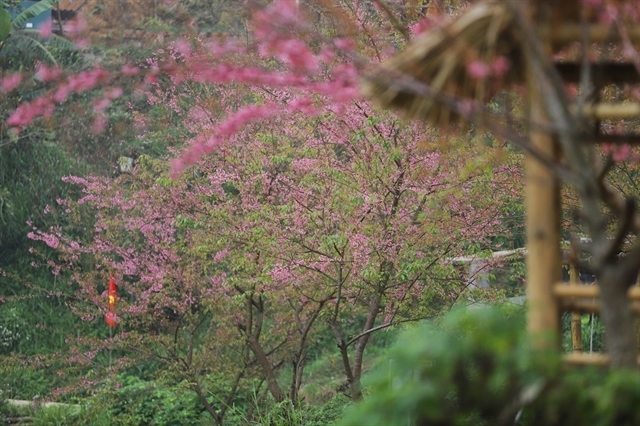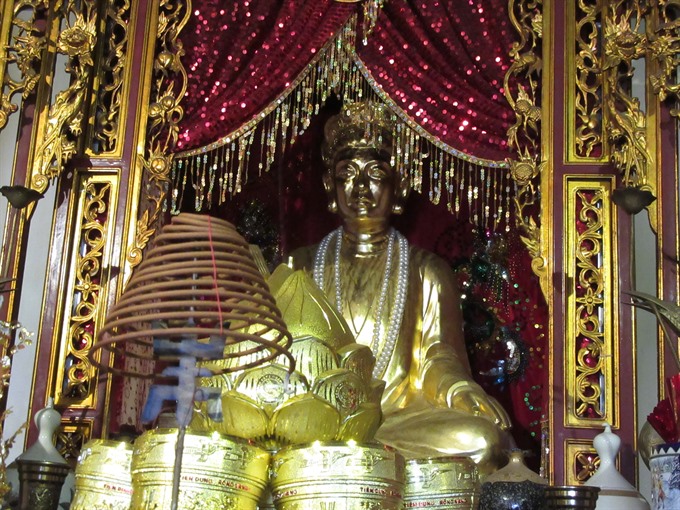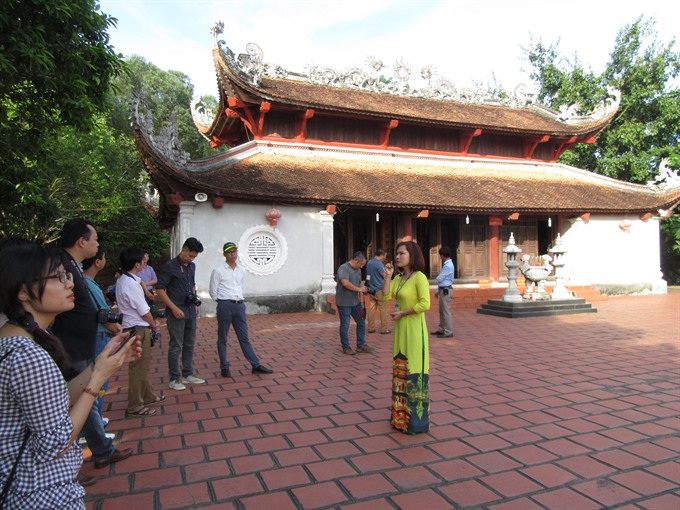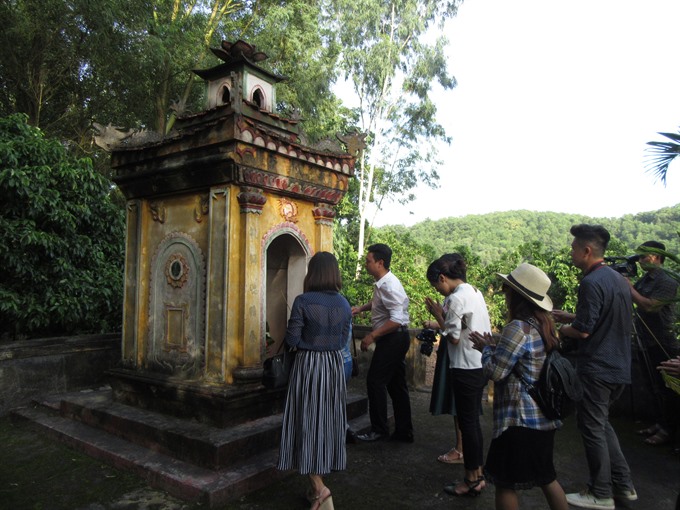 Features
Features

After more than 400 years, Vietnamese people are still passionate about the amazing life of Nguyễn Thị Duệ, the first and only doctoral laureate female mandarin in Việt Nam’s feudal history.
 |
| Serene: The temple of Nguyễn Thị Duệ overlooks a beautiful lake and endless ricefields.-VNS Photo Bạch Liên |
By Vương Bạch Liên
Far from the hustle of crowded streets in Hải Dương City, the Temple of Nguyễn Thị Duệ is surrounded by Phượng Hoàng (phoenix) mountain in Kiệt Đặc Village. It overlooks endless rice fields.
Every day, at sunset, hundreds of storks come home to nest in trees around an immense lake in front of the temple dedicated to the first and only doctoral laureate female mandarin in Việt Nam’s feudal history.
Since 2006, when local people built the temple, the storks flocked there to nest. Villagers believe that it is a prosperous and sacred region.
Behind the temple, is Duệ’s brick tomb, built in the 17th century on Mâm Xôi Hill in the form of a tower. The tower called Tịnh Phi is presently among the top eight historical relics of Chí Linh.
It was damaged in late 18th century and restored in 1993 by villagers. Since then, it has been visited every day by teachers and students and other pilgrims from the region and across the nation.
After more than 400 years, Vietnamese people are still passionate about the amazing life of Nguyễn Thị Duệ.
During the feudal period, women did not have equal rights to men. They had no rights to study or take part in any exams. But Duệ, who was a talented, beautiful and virtuous woman, overcame all the strict regulations to get her doctorate.
In 1594, at the age of 20, Duệ disguised herself as a man to take an examination held by King Mạc Kính Cung and won the top position. She became the first and the only female doctoral laureate in Vietnamese history.
At a royal banquet for new laureates, King Mạc Kính Cung was surprised to find a young doctor with slender form and pleasant face. A shadow of doubt appeared in his mind. He later discovered that Duệ was actually a woman. Admiring her talent, the King forgave her, then married her and gave her the name Tịnh Phi. He later assigned her to teach his other wives and concubines. People used to call her "Queen of Stars".
 |
| Inspiration: The Statue of Nguyễn Thị Duệ in her temple in Chí Linh District of Hải Dương province.— VNS Photo Bạch Liên |
After the fall of the Mạc Dynasty, she was still respected and entrusted with educating palace women by the Lê Kings and Trịnh Lords.
Duệ also contributed much to the country’s education. She cared much about the national Confucian examinations and the selection of talented students. In most examinations, she herself selected and trained gifted students from Hải Dương and other regions.
She also had a big heart. Faced with natural calamities and war destruction of her country, she persuaded the Trịnh Lords to share out free food to the destitute and to develop fertile rice-fields. Legend has it that her own family was poor and humble and that her brother was treated harshly by people in her village. When she became a mandarin at the Royal Court, she did not seek revenge.
Towards the end of her life, she went back to her homeland in Kiệt Đặc Village. She died when she was more than 80 years old. Local people, who adored her talent and virtue, built a statue to worship her.
At the Mao Điền Temple of Literature in Hải Dương, she was worshipped with seven other great national personalities born in the province, including Nguyễn Trãi, illustrious scholar and poet; respected teacher Chu Văn An; and herbal doctor Tuệ Tĩnh, founder of Vietnamese traditional medicine.
Despite a brillant life, Duệ was among many other mandarins who were forgotten for a long time when historians failed to record history properly. While Vietnamse knew about other outstanding women, such as the Trưng sisters, or poet Hồ Xuân Hương, Duệ was still unknown to many until recently.
The Mạc Dynasty paid great attention to find talent for the country by organising examinations. Even when they had to flee to Cao Bằng to escape from revenge by Trịnh Lords, King Mạc Kính Cung still preserved the tradition.
The Mạc Dynasty had a postive role in the history of Việt Nam by helping improve the life of people by developing handicrafts, opening shipbuilding workshops and developing external trade relations with foreign countries.
But the historians of the time, influenced by the opinions of the Lê and Nguyễn dynasties, thought the Mạc Dynasty amounted to little under the reign of King Mạc Kính Cung. And so, they didn’t want to note the names of those who succeeded in the examinations during his reign and afterwards.
"Maybe, this is the reason why Nguyễn Thị Duệ was forgotten for such a long time,” said Associate Prof Dr Đỗ Thị Hảo from Hà Nội Folk Literature and Arts Association, who studied about the life of Duệ.
Duệ has become a role model inspiring many Vietnamese women to go to school and succeed in a career.
 |
| Still relevent: A guide shows people around the temple and explains the role of Nguyễn Thị Duệ in the development of Vietnamese education.— VNS Photo Bạch Liên |
Roles for women: VN leads in Asia
A report released in June this year by by Deloitte Global, one of the world’s largest accounting firms, said Việt Nam has the highest percentage of women in top positions in Asia.
It said Việt Nam took the lead as women represented 17.6 per cent of executive board members throughout the nation. The proportion of female leaders in Việt Nam is even higher than the global average of 15 per cent.
The Chairwoman and CEO of Deloitte Vietnam, Hà Thi Thu Thanh, said in the report that in the past 25 years, after the Law on Enterprises came into effect, women-owned businesses had grown rapidly. Deloitte predicted that the proportion of women on executive boards in Việt Nam would increase to 35 per cent by 2020.
Moreover, for the proportion of women business owners, Việt Nam was also ranked among the Top 10 markets in a report by Mastercard released in April.
However, few Vietnamese women join politics. The country has three women in the Politburo. Up until August this year, only 11 out of 30 ministries and government organs had women in leadership.
“Although the proportion of women in leadership roles in politics and the economy has increased in recent years, it is still insufficient compared to their potential,” said Tôn Nữ Thị Ninh, vice chairwoman of Việt Nam’s Peace Committee, at an international conference last year. She added that the percentage of Vietnamese women in the Party Central Committee remained at only 10 per cent.
She said the Government should provide more opportunities for women. Even though Việt Nam was regarded as a pioneer in narrowing gender gap in recent years, it still had much to do to promote gender equality.
 |
| Legacy: Tourists from across the nation burn incense to Nguyễn Thị Duệ, the only female mandarin in Viêt Nam’s feudal history. — VNS Photo Bạch Liên |
Many Vietnamese parents still don’t encourage girls to climb high the education ladder, believing that the more they study, the more difficult it will be to find a husband. Some people still think that the best place for women is at home cooking, cleaning and taking care of children.
As a result, many women lose out on opportunities for higher education, quality jobs, and deeper social engagement.
Nguyễn Thu Hà, chair of the Vietnamese Women’s Union, said parents should create more favourable conditions for their children to go to school and get a better job.
She said steps should be taken at home, in schools, and in communities to teach boys to appreciate, even look up to women, and acknowledge that care-giving and housework are natural tasks for both men and women. Girls should be taught to treasure themselves, to cherish and chase dreams bigger than traditional roles as wives and mothers.
If Nguyễn Thị Duệ’s parents didn’t support her disguise as a man to take examinations, the country would never have had such a brillant role model.
Alive, she wrote many poems, but most are lost. Only a few verses survive. They include:
Women who are motivated
Can achieve what talented men can do.
(Nữ nhi dù đặng có lề
Ắt là tay thiếp kém gì trạng nguyên.) — VNS




